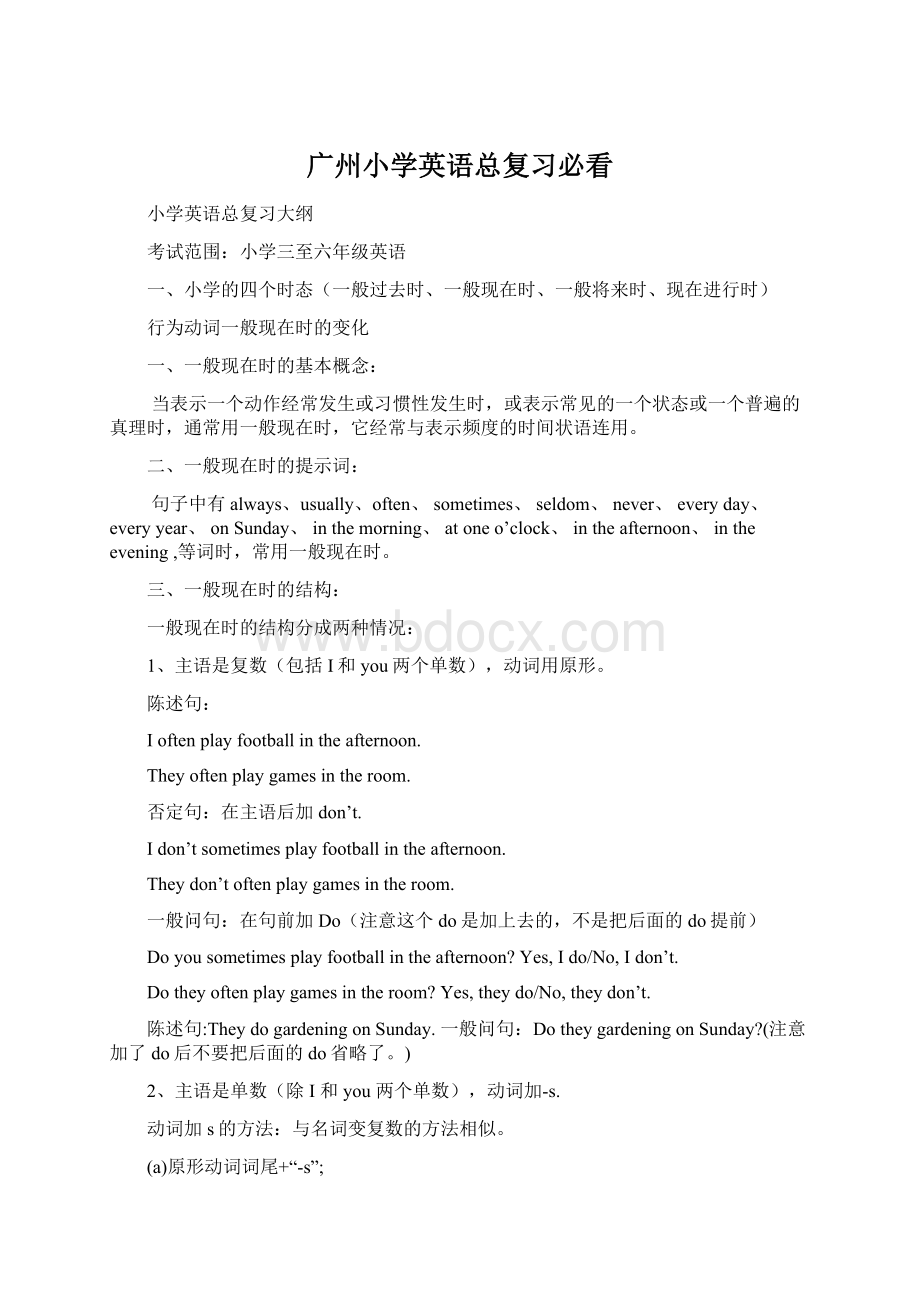广州小学英语总复习必看.docx
《广州小学英语总复习必看.docx》由会员分享,可在线阅读,更多相关《广州小学英语总复习必看.docx(13页珍藏版)》请在冰豆网上搜索。

广州小学英语总复习必看
小学英语总复习大纲
考试范围:
小学三至六年级英语
一、小学的四个时态(一般过去时、一般现在时、一般将来时、现在进行时)
行为动词一般现在时的变化
一、一般现在时的基本概念:
当表示一个动作经常发生或习惯性发生时,或表示常见的一个状态或一个普遍的真理时,通常用一般现在时,它经常与表示频度的时间状语连用。
二、一般现在时的提示词:
句子中有always、usually、often、sometimes、seldom、never、everyday、everyyear、onSunday、inthemorning、atoneo’clock、intheafternoon、intheevening,等词时,常用一般现在时。
三、一般现在时的结构:
一般现在时的结构分成两种情况:
1、主语是复数(包括I和you两个单数),动词用原形。
陈述句:
Ioftenplayfootballintheafternoon.
Theyoftenplaygamesintheroom.
否定句:
在主语后加don’t.
Idon’tsometimesplayfootballintheafternoon.
Theydon’toftenplaygamesintheroom.
一般问句:
在句前加Do(注意这个do是加上去的,不是把后面的do提前)
Doyousometimesplayfootballintheafternoon?
Yes,Ido/No,Idon’t.
Dotheyoftenplaygamesintheroom?
Yes,theydo/No,theydon’t.
陈述句:
TheydogardeningonSunday.一般问句:
DotheygardeningonSunday?
(注意加了do后不要把后面的do省略了。
)
2、主语是单数(除I和you两个单数),动词加-s.
动词加s的方法:
与名词变复数的方法相似。
(a)原形动词词尾+“-s”;
help(帮助)—helpscome(来)—comesdance(跳舞)—dances
(b)原形动词词尾“ch、sh、o、s、x”+“-es”
teach(教)—teacheswash(洗)—washesgo(去)—goes
fix(安装)—fixeswatch(看)—watchesdo—does
(c)原形动词词尾为“辅音字母+y”时,后加“-ies”,若是”元音字母+y”,只加“-s”.
Study(学习)—studiesfly(放)—flies
try(尝试)—triesplay(游戏)—plays
(d)have变成has
陈述句:
Hegetsupat6o’clock.
SheusuallywatchesTVintheevening.
Shehasbreakfastat7:
00.
否定句:
在主语后加doesn’t,然后把动词后的s去掉。
Hedoesn’tgetupat6:
00.
Shedoesn’tusuallywatchTVintheevening.
一般问句:
在句子前加does,然后把动词后的s去掉。
Doeshegetupat6:
00?
Yes,hedoes/No,hedoesn’t.
DoessheusuallywatchTVintheevening?
Yes,shedoes/No,shedoesn’t.
简单来说:
动词否定句一般问句
复数(主语)原形don’t加Do在前
单数(主语)动词+sdoesn’t(去s)加Does在前(去s)
(单数时否定句和一般疑问句动词中的s去掉)
四、如何判断一般现在时和现在进行时:
1、看提示词
2、是现在进行时的,加“是动词”和动词后加ing.
3、是一般现在时看主语,主语是复数的动词用原形,主语是单数的动词+s.
4、有let’s、don’t、can、will、please的句子用动词原形,to后面加的动词也用原形。
现在进行时讲解与练习
一.现在进行时:
表示现在正在进行的动作。
二.结构:
主语+be(am,is,are)+动词现在分词形式。
三.动词变现在分词:
(一)直接在动词后面加-ing
1.do-doing做2.stand-standing站3.sleep-sleeping睡觉
4.eat-eating吃5.sing-singing唱6.drink-drinking喝
7.read-reading读8.look-looking看9.walk-walking散步
(二)以不发音的e结尾的去e加-ing
e-coming来2.dance-dancing跳舞3.close-closing关
4.make-making制造5.ride-riding骑6.write-writing写
7.take-taking拿走8.phone-phoning打电话9.move-moving移动搬
(三)重读闭音节,双写最后一个辅音字母,再加-ing
1.sit-sitting坐2.hoping-hopping单脚跳3.swim-swimming游泳
4.run-running跑5.cut-cutting切6.put-putting放7.get-getting得打
8.shop-shopping购物9.skip-skipping跳绳10.begin-beginning开始
四.句型:
现在进行时句子提示词:
1.now2.look3.Lookatthe4.Listen5.…see?
6.It′s…o′clock.
现在进行时的肯定句:
(一)陈述句(肯定句)
主语+be(am,is,are)+现在分词,如:
IamreadingEnglish.我正在读英语。
Heiswriting.他正在读英语。
Youarerunning.你正在跑步。
(二)一般疑问句
Be(Am,Is,Are)+主语+现在分词,如:
1.Areyousinging?
你正在唱歌吗?
Yes,Iam.是的,我在唱歌。
/No,I′not.不,我不在唱歌。
2.Ishe(she)listeningtomusic?
他(她)在听音乐吗?
Yes,he(she)is.是的,他(她)在听音乐。
No,he(she)isn′t.不,他(她)不在听音乐。
(三)否定句:
主语+be(am,is,are)+not+现在分词
Heisn′twatchingTV.他没在看电视。
Iamnotcooking.我没有在做饭。
Wearen′thavingEnglishclass.我们没在上英语课。
◆注意◆isnot和arenot可缩写为isn′t和aren′t.
(四)特殊疑问句
疑问句+be(am,is,are)+主语+现在分词,如:
1.Whaareyoudoing?
你正在干什么?
Iamdoingmyhomework.我正在做作业。
2.Whatishe(she)doing?
他(她)正在干什么?
He(she)isridingabike.他(她)正在骑自行车。
注意:
1.表示状态、思想、感情和感觉的动词,如:
see,hear,love,know,want,hope,
like等,没有进行时态。
Iamhavingmanybooks.(这是错误的句子)
Iamhavingagoodtime.(这才是正确的句子)
二、同义单词辨析、同义短语辨析
Lookafter=take(good)careof
Enjoyoneself=haveagoodtime
Lookfor=find
Enjoydoing=likedoing
Nomore=not……anymore
Fillwith=befullof
Alotof……=lotsof……=plentyof……
Finally=atlast
befrom=comefrom
preferto……=like……better
begoodat=dowellin
morethan=over
eachother=oneanother
begoingto=will
onone’swayto例:
onmywayhome在我回家的路上、onhiswaytoschool在他去学校的路上
bytheway顺便说一下
Inthetree——Onthetree(生长在树的东西)
Atthetable(坐在桌子旁边)——Onthetable
Inthenewspaper(报纸上印的东西)——onthenewspaper
inthesun在太阳下
gotoschool去上学gototheschool去学校
inhospital住院inthehospital去医院看人或做事
三、可数名词和不可数名词
一)、可数名词和不可数名词的数量
可数名词:
cake,apple,noodles,ricenoodles,chips,carrot,cabbage,tomato,potato,pepper,egg,grape,onion,mushroom,orange,dumpling,hamburger,bun,sandwich……
不可数名词:
流质:
coke,water,porridge,tea,coffee,soup,juice,milk,ink……
肉类:
meat,fish,beefsteak,chicken,beef,pork,mutton,duck……
其他:
pasta,broccoli,toast,salad,dim-sum,bread,rice,pizza,tissue,chalk,paper,news,homework,housework……
既可以是可数名词也可以是不可数名词:
chocolateice-cream
1、可数名词可以加复数,可以和数词直接搭配表示数量,如:
twoeggsthreecats
2、不可数名词不可以加复数表示数量,也不可以和数词直接搭配,要表示数量要借助量词。
如:
water是不可数名词,我们不能说twowater,但可以用twobottlesofwater来表示数量。
3、注意:
用量词表示不可数名词的数量只要在量词上加复数就行了,不可数名词不能加。
如:
twobowlsofrice只要在bowl上加s就行了,rice是不可数名词不能加s。
例:
不可数名词不可数名词和量词的搭配不可数名词和量词的搭配(复数)
porridgeabowlofporridgefourbowlsofporridge
beefsteakaplateofbeefsteaksevenplatesofbeefsteak
broccoliaplateofbroccolinineplatesofbroccoli
二)、可数名词也可以和量词搭配,单数时要在名词上加复数,复数时要在量词和名词上都加上复数。
例:
可数名词可数名词和量词的搭配可数名词和量词的搭配(复数)
tomatoakilooftomatoestwokilosoftomatoes
potatoabasketofpotatoessixbasketsofpotatoes
eggaboxofeggstenboxesofeggs
三)、可数名词和不可数名词与therebe的搭配。
可数名词单数与thereis搭配,如:
Thereisabowlonthetable.
可数名词复数和thereare搭配,如:
Therearefivedumplingsinthebowl.
不可数名词与thereis搭配,如:
Thereissomejuiceinthebottle.Thereisalotofporridgeinthebowl.
和量词搭配时看量词的单复数来决定用thereis还是thereare。
四、非谓语动词总结
动词使用原形:
1.Will/Wouldyouplease+(not)+V(原)….?
2.Whynot+V(原)….?
=Whydon’tyou+V(原)
3.hadbetter(not)+V(原)
加动词不定式省to:
使役动词或感官动词后加动词不定式省to:
1.let/make/havesb.do…让/使某人做…
2.watch/see/hear/notice/feelsb.do…..
注意:
在主动语态中省to的不定式在被动语态中要加to
对比:
1.hear/seesb.do…听见/看见…做了…
hear/seesb.doing….听见/看见…正做…
usedtodo…过去常常做…,
2.be/get/becomeusedtodoing…习惯于做…
beusedfordoing…被用于做….
beusedtodo…..被用于做….
动词后面加不定式:
1.tellsb.(not)todo…告诉某人(不)做…
asksb.(not)todo…叫某人(不)做…
2.wanttodo..=wouldliketodo…想做….
3.wantsb.todo..=wouldlikesbtodo..想要某人做...
4.plantodo..计划做…
5.begintodo…,starttodo…,
6.trytodo..努力/尽力做…trytolearnEnglishwell
7.childrenlovetoplaythisgame
8.calltodo…打电话做…
9.hopetodo…,hope(that)+句子
10.besorrytodo…很抱歉做…
11.help(sb)(to)do…
12.getsb.todo….使某人做某事…
13.learntodo….学做….
14.teachsb.todo….教某人做…
15.wishsb.todo….希望/愿某人做某事
16.can’twaittodo…迫不及待做..
17.seemtodo…似乎要做…
18.betodo…将要做…
19.agreetodo…..同意做…..
20.prefertodo……ratherthando…..宁愿做…而不做…
21.Ittakessb.sometimetodosth.花某人多长时间做某事
22.It’s+adj.+(forsb.)todo…..(对于某人)做某事adj.
23.sb.findsit…todo…..某人发现做某事…..
24.It’sbetter/best(forsb.)todo…较好/最好做….
接动名词:
1.enjoydoing…,enjoyoneself
2.finishdoing…
3.hatedoing…讨厌做….
4.begoodatsth.=dowellinsth.
begoodatdoing…=dowellindoing…..
5.what/howaboutdoing…?
6.thanksb.fordoing….感谢某人做….
7.havefundoing…做…有乐趣
8.haveproblems/difficultdoing…做……有困难/问题
9.takepartindoing….(积极)参加做….
10.practisedoing…
11.beworthdoing…值得做…
12.feellikedoing….想要做….
13.beinterestedindoing…
14.bydoing…通过,以….
15.thewayofdoing….做….的方法
16.keepdoing…一直做…
17.keepsb.doing…让某人一直做…
keepondoing…反复做….
18.succeedindoing…成功做某事
19.bebusydoing….
20.spend….(in)doing….花时间/钱做…
21.can’thelpdoing….禁不住/情不自禁做某事
22.insteadofdoing…..代替做某事
23.preferdoing….todoing宁愿做…而不是做…;较喜欢做…而不是做….
24.keep/stop/preventsb.fromdoing…..阻止某人做某事
25.mind(sb./one’s)doing…介意(某人)做….
既可加不定式,又可加动名词,但有区别:
1.likedoing…表示一般情况
liketodo..喜欢/愿意做…表示具体谋一次情况
2.remembertodo…记得要做…
rememberdoing….记得做过….
3.forgettodo…忘记要做…
forgetdoing….忘记做过…
4.stoptodo…停下来做..(另一件事)
stopdoing…停止做…..
5.beafraidtodo…不敢做…;害怕做…;
beafraidofsth.害怕某物
beafraidofdoing…害怕做
6.goontodo…继续做另一件事
goondoing….继续做同一件事
7.needtodo…..需要做…..
needdoing……(某物/人)需要被….
五、比较级与最高级
有些双音节和三音节的形容词和副词在前面加more\most
mostboring
mostslowly
mosthorrible
mostexcited
mostdelicious
mostinteresting
mostimportant
mostdangerous
mostfamous
mostbeautiful
mostdifficult
mostpatient
mosthardworking
mosthandsome
mosttired
moreboring-------
moreslowly-------
morehorrible----
moreexcited------
moredelicious---
moreinteresting---
moreimportant----
moredangerous---
morefamous-------
morebeautiful-----
moredifficult-------
morepatient--------
morehardworking--
morehandsome-----
moretired-----------
boring--------------
slowly--------------
horrible-----------
excited------------
delicious----------
interesting--------
important---------
dangerous---------
famous-------------
beautiful-----------
difficult------------
patient--------------
hardworking-------
handsome-----------
tired-----------
特殊比较级和最高级
good---better----bestwell---better---best
many---more----mostmuch---more---most
bad----worse----worstill----worse----worst
little------less------leastfar------farther------farthest
六、代词
第一人称
第二人称
第三人称
第一人称
第二人称
第三人称
人身代词
我
你
他
她
它
我们
你们
他她它们
主格
I
you
he
she
it
we
you
they
宾格
me
you
him
her
it
us
you
them
物主代词
我的
你的
他的
她的
它的
我们的
你们的
他/她/它们的
形容词性
my
your
his
her
its
our
your
their
名词性
mine
yours
his
hers
its
ours
yours
theirs
七、反义词
吵闹的
noisy
quiet
宁静的
里面的
inside
outside
外面的
富
rich
poor
穷
暖
warm
cool
冷
早
early
late
晚
好
good
bad
坏
杂乱的
messy
trim
整洁的
弱
weak
strong
强
忙
busy
free
闲
年老
old
young
年轻
易
easy
difficu